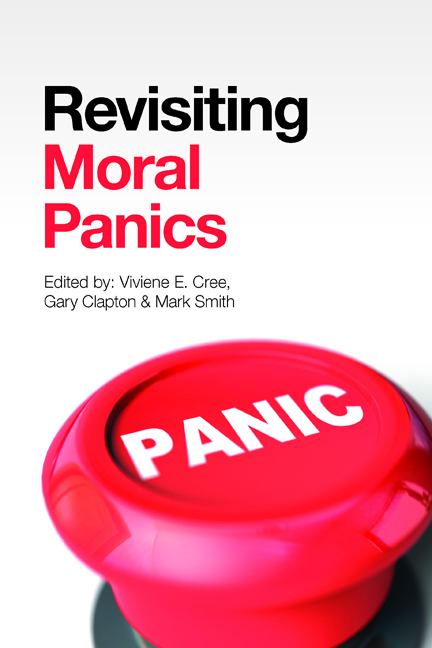Book contents
- Frontmatter
- Contents
- Contributors
- Preface
- Commentary moral panics yesterday, today and tomorrow
- Part One Gender and the family
- Part Two Moral panics in our time? Childhood and youth
- Part Three The state, government and citizens
- Part Four Moral crusades, moral regulation and morality
- Afterword the moral in moral panics
- Conclusion Moral panics and beyond
- Index
Ten - The Rotherham abuse scandal
Published online by Cambridge University Press: 08 March 2022
- Frontmatter
- Contents
- Contributors
- Preface
- Commentary moral panics yesterday, today and tomorrow
- Part One Gender and the family
- Part Two Moral panics in our time? Childhood and youth
- Part Three The state, government and citizens
- Part Four Moral crusades, moral regulation and morality
- Afterword the moral in moral panics
- Conclusion Moral panics and beyond
- Index
Summary
Introduction
This chapter examines the Rotherham abuse scandal, which centres on the exploitation and abuse of (mostly) teenage girls between 1997 and 2013 in the South Yorkshire town of Rotherham and the publication of an official inquiry report (Jay, 2014) into the abuse and, more specifically, into agencies’ response to it. The report was released on 26 August 2014 and sparked intense media coverage. It is not difficult to see why. The report details the violent and sexual abuse and trafficking of minors, often over a number of years, carried out by groups of men who had befriended these children ‘on the streets’. This pattern of abuse is described as ‘child sexual exploitation’ (CSE). The report identifies 1,400 victims, emphasising that this is a ‘conservative estimate’. Around a third were in local council care or known to social services. The report is highly critical of the two key agencies in charge of CSE, namely the police and the council and its social and children’s services. It paints a picture of serious failings and repeated inaction; Jay particularly criticises senior staff and management who actively ignored concerns about CSE.
This chapter considers the Rotherham abuse scandal from a moral panic perspective. It explores in detail media representations of the scale of the problem and the framing of blame, two key elements through which moral panics are instigated (Cohen, 2002). To this end, a limited press analysis was carried out in which the coverage of four newspapers was examined during the five days following the release of the Jay report. The newspapers were chosen to capture opposite ends of the political spectrum and the market: the legalist and moderately conservative broadsheet, The Times; the populist conservative tabloid, the Sun; the staunchly and morally conservative, mid-market paper, the Daily Mail; and the liberal left-wing broadsheet, the Guardian. A search of the LexisLibrary database produced a total of 180 articles for the time-period, between 30 and 38 per day, confirming that this was indeed a scandal of considerable proportion.
The Rotherham abuse scandal and moral panic theory
The nature and scale of the problem
In his analysis of moral panics Cohen (2002) argues that heightened societal interest and outrage are driven by media representations of the subject as a serious and large-scale problem, indicative of the moral malaise of society as a whole.
- Type
- Chapter
- Information
- Revisiting Moral Panics , pp. 113 - 122Publisher: Bristol University PressPrint publication year: 2015

